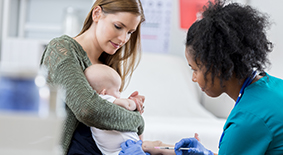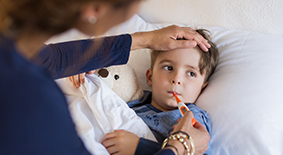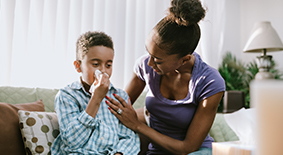What You Need to Know About Measles
Once a widespread illness, measles has become rare in the U.S. thanks to vaccines. Unfortunately, some measles outbreaks do still occur in the U.S., so it’s important to make sure your family is vaccinated.
What is measles?
Measles, also called rubeola, is a very contagious disease caused by a virus. It can cause serious health complications at the time of infection, as well as later in life. It starts with fever, and soon after, it causes a cough, runny nose and watery eyes. Then a rash of red spots breaks out, which starts at the head and spreads to the rest of the body.
Worse than just a cold or the flu, measles is a serious disease that can be prevented with a vaccine.
While measles is probably best known for the full-body rash it causes, early symptoms include:
- High fever
- Runny nose
- Watery eyes
- Hacking cough
Later symptoms include:
- High fever
- Koplik’s spots–small red rings with blue-white centers that appear inside the mouth
- Rash–typically appears between days three and five after the onset of early symptoms, first on the forehead; then moving downward over the face, neck and body; and then down to the arms and feet
Because measles is so contagious, it’s important for you to understand how it spreads so you can take the proper precautions.
How does measles spread?
Measles is an extremely contagious virus—you can catch it just from passing through the same room that an infected person was in hours earlier. Here’s how it works:
- The measles virus lives in the nose and throat mucus of an infected person. It can then spread to others through coughing and sneezing.
- The measles virus can live for up to two hours in an airspace where the infected person coughed or sneezed.
- People can become infected by breathing the contaminated air or touching an infected surface and then touching their eyes, nose or mouth.
- Measles can spread quickly. In fact, 90% of the people close to a person infected who are not immune will also become infected.
- Infected people can spread measles to others from four days before through four days after the rash appears.
How you can help stop the spread of measles
Because measles is so contagious, the best way to stop the spread is to make sure everyone in your family is vaccinated.
Call your child’s pediatrician immediately if you suspect your child:
- Is not immunized against measles.
- Has been exposed to someone with measles.
- May have measles.
To prevent spreading the disease to other people, it’s important to let your child’s pediatrician know about your measles concerns before planning your visit. If you suspect that your child may have measles, be sure to keep him home from school or day care for four days after the rash appears.
How can I protect my newborn from measles?
Mothers who are immunized for measles pass protection for measles to their infants, but that protection begins to disappear in the first few months of an infant’s life.
During this time, make sure friends, caregivers and family members are up to date on their vaccinations.
How can I protect my young child from measles?
The protection a baby receives from the mother fades over time, so immunization is necessary when a child is between 12 and 15 months old. After receipt of one measles, mumps and rubella immunization (MMR) or one measles, mumps, rubella and varicella immunization (MMRV), a child is 95% protected against measles.
“Making sure that your child receives a MMR vaccine is the best way to protect your child from measles,” says Andi Shane, MD, MPH, System Medical Director of Infectious Diseases at Children’s Healthcare of Atlanta.
A booster dose is then given to a child around 4 to 6 years of age. This second dose is needed to boost protection from measles to 98%.
Vaccines prevent many harmful diseases and are safe. Discuss any vaccine-related decisions with your child’s pediatrician.
Parents, We’re Here to Help
Contact Us 404-785-KIDS (5437)


